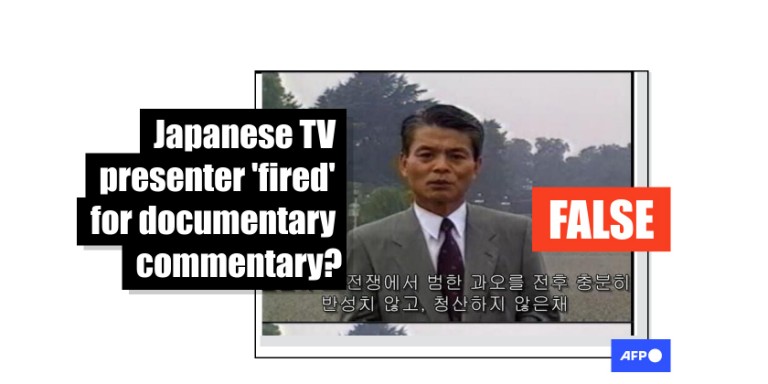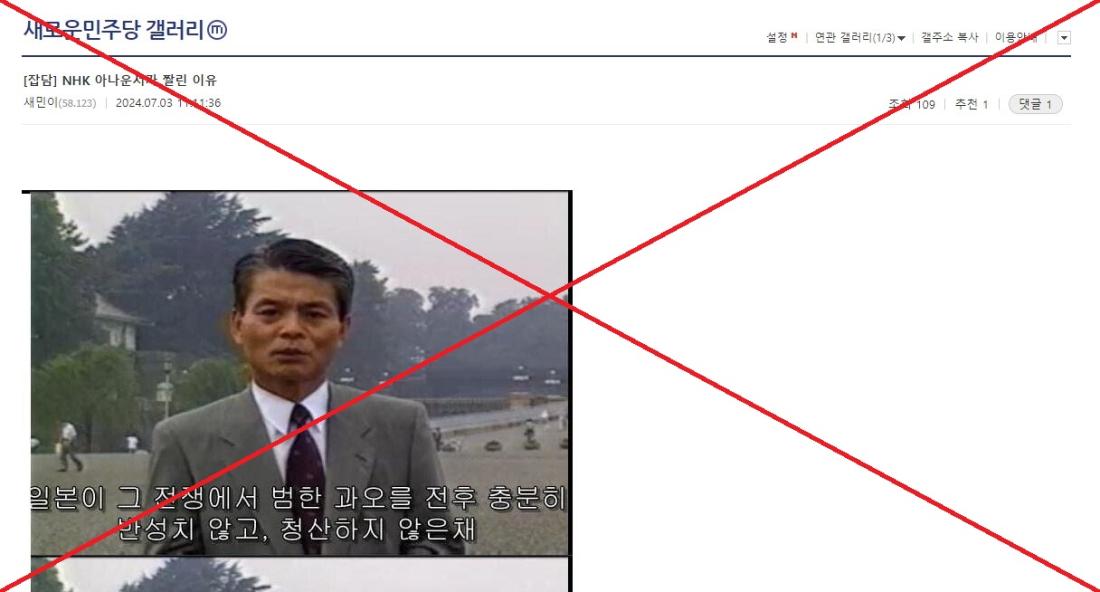
Japanese broadcaster rubbishes claim journalist was 'fired' for World War II commentary
- This article is more than one year old.
- Published on July 16, 2024 at 05:22
- 2 min read
- By SHIM Kyu-Seok, AFP South Korea
"The reason why this Japanese reporter was fired from NHK," read a Korean-language post shared on South Korean forum DC Inside on July 3, 2024.
The post included a series of screenshots that appear to show a reporter speaking on an old television programme.
Korean-language subtitles on the screenshots suggest the reporter was expressing a critical view of Japan's actions in World War II.
"Underlying a distrust in Japanese society is the belief that Japan failed to properly reflect on the crimes it committed in that war and became rich without overcoming its past," he says.
"There is no guarantee that Japan will go on to gain the trust of other Asians if it does not take the stance of actively compensating Asia for the Pacific War."
He goes on to say a similar "egotism and hubris" from the past seemed to be rearing its head in modern-day Japan.

Ties between Japan and South Korea have long been strained over Tokyo's brutal decades-long occupation of the Korean peninsula before and during World War II.
Around 780,000 Koreans were conscripted into forced wartime labour by Japan, according to data from Seoul, not including women forced into sexual slavery by Japanese troops.
The claim and screenshots circulating online were also shared in other South Korean forums, including here and here.
But the journalist pictured in the screenshots was not fired for his remarks.
Pacific War documentary
A keyword search on Google found the screenshots were taken from a six-part documentary series titled "The Pacific War", which was presented by commentator Hajime Yamamoto (archived link).
The series was made by Japanese public broadcaster NHK and aired between December 6, 1992 and August 15, 1993.
AFP was able to find the documentary on NHK's "On Demand" website, with the scenes used in the false posts appearing in the sixth and last episode of the series broadcast on August 15, 1993 (archived link).
The full segment of Yamamoto's final remarks show he was in fact summarising a series of interviews with people across Asia who felt Japan had not changed following World War II.
"During the course of this series of interviews, I have heard many times from people in Asia that the Japanese have not changed, neither in the past nor in the present.
"How can Japan and we Japanese respond to these voices nearly 50 years after the end of the war, and how can we coexist with the rest of the world? I think the time has come for us to respond to this serious question," he says.
A biography of Yamamoto -- who died in 2006, aged 66 -- on the broadcaster's website makes no mention of him being fired (archived link). In fact, it says he was honoured for his work on the series at the prestigious Galaxy Awards (archived link).
Broadcasting records in NHK's archives also show Yamamoto contributed to numerous programmes after the final episode was broadcast in 1993 up until 2003 (archived link).
Responding to an AFP enquiry, NHK said there is "no such record" of Yamamoto being fired.
AFP has debunked other misinformation exploiting the strained ties between Seoul and Tokyo here, here and here.
Copyright © AFP 2017-2026. Any commercial use of this content requires a subscription. Click here to find out more.
Is there content that you would like AFP to fact-check? Get in touch.
Contact us
